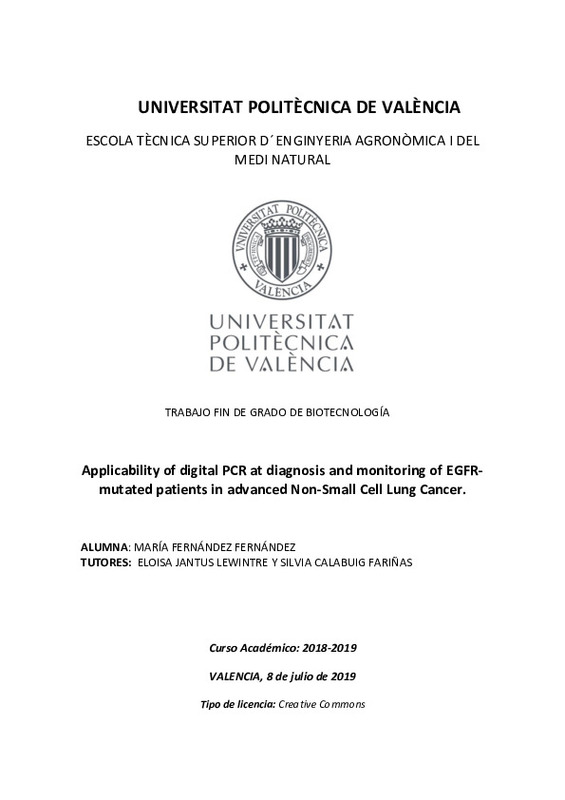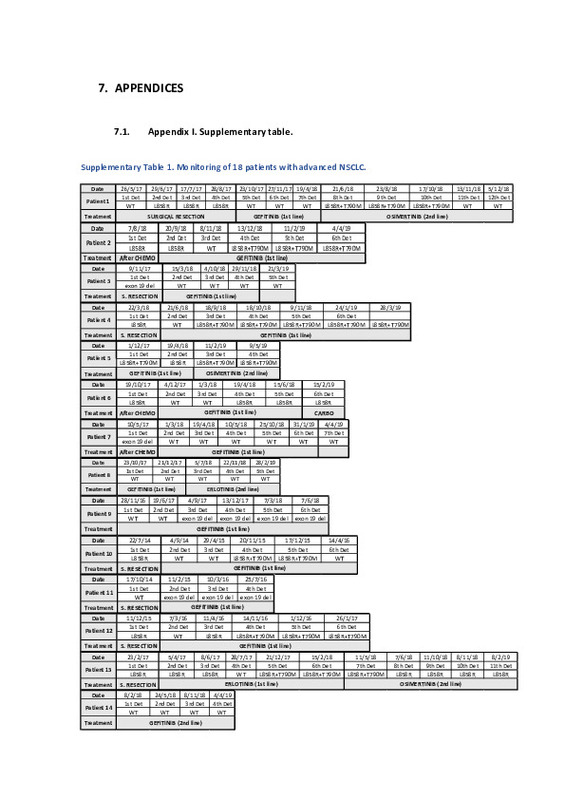JavaScript is disabled for your browser. Some features of this site may not work without it.
Buscar en RiuNet
Listar
Mi cuenta
Estadísticas
Ayuda RiuNet
Admin. UPV
Aplicabilidad de la PCR digital en el diagnóstico y monitorización de pacientes EGFR mutados en cáncer de pulmón no microcítico (CPNM) avanzado
Mostrar el registro sencillo del ítem
Ficheros en el ítem
| dc.contributor.advisor | Jantus Lewintre, Eloisa
|
es_ES |
| dc.contributor.advisor | Calabuig Fariñas, Silvia
|
es_ES |
| dc.contributor.author | Fernández Fernández, María
|
es_ES |
| dc.date.accessioned | 2019-09-02T10:39:14Z | |
| dc.date.available | 2019-09-02T10:39:14Z | |
| dc.date.created | 2019-07-22 | |
| dc.date.issued | 2019-09-02 | es_ES |
| dc.identifier.uri | http://hdl.handle.net/10251/124739 | |
| dc.description.abstract | [ES] ANTECEDENTES: Actualmente, el cáncer de pulmón es la principal causa de incidencia y mortalidad de cáncer en todo el mundo para ambos sexos. El cáncer de pulmón no microcítico (CPNM) representa el 85% de todos los tipos de este cáncer. El tratamiento y el pronóstico del cáncer están estrechamente relacionados con el tipo y el estadio del tumor. Por lo tanto, el descubrimiento de mutaciones somáticas en el gen del receptor del factor de crecimiento epidérmico (EGFR), que ocurre en aproximadamente el 10-30% de los pacientes con CPNM, supuso una mejora significativa en el manejo clínico de los pacientes con CPCNP avanzado. Los tratamientos dirigidos con inhibidores de la tirosina quinasa de EGFR (TKI, por sus siglas en inglés) dieron mejores resultados con menos toxicidad en comparación con la quimioterapia estándar. Sin embargo, la resistencia adquirida a EGFR-TKIs puede aparecer en casi todos los pacientes después de 10-14 meses de tratamiento. El mecanismo de resistencia más común es la adquisición de la mutación T790M en el exón 20 del gen de EGFR. En este contexto, la monitorización en tiempo real de las mutaciones de EGFR es esencial para determinar las decisiones terapéuticas más apropiadas para cada paciente. En los últimos años, la biopsia líquida ha llegado como una primera opción para detectar precozmente mecanismos de resistencia siendo esta mínimamente invasiva para obtener información relevante sobre el tumor. - MÉTODOS: En este estudio se incluyeron pacientes con CPNM avanzado, mutados en EGFR y tratados con TKI. Las muestras de plasma se recolectaron en el momento del diagnóstico y durante todo el tratamiento estándar con TKI hasta la progresión. El ADN tumoral circulante (ctDNA) se aisló y analizó para investigar el estado mutacional de EGFR mediante dos enfoques de PCR digital diferentes. La primera aproximación, BEAMing (Sysmex®), se basa en una PCR de emulsión, donde las moléculas de ADN diana se amplifican por clonación utilizando partículas magnéticas. La segunda, denominada Quant StudioTM, usa micropocillos para dividir la muestra en miles de particiones. Los resultados de ambos métodos fueron comparados y correlacionados con variables clínicas. - RESULTADOS: De los 18 pacientes analizados, la relación de concordancia entre tejido y plasma fue del 61.1%. En el 80% de los pacientes con enfermedad progresiva, la mutación T790M se detectó como mecanismo de resistencia en ctDNA. Se encontró buena correlación entre los dos métodos de PCR digital evaluados. - CONCLUSIÓN: Los resultados presentados en este trabajo sugieren que la técnica de dPCR para el análisis de ctDNA en CPNM avanzado es una tecnología sensible para el análisis del estado mutacional de EGFR. En este contexto, representa el comienzo de un enfoque innovador para el diagnóstico molecular del cáncer, que tiene el potencial de informar la detección temprana del cáncer, detectar la enfermedad residual mínima, reflejar la heterogeneidad del tumor y controlar la evolución de la enfermedad resistente. | es_ES |
| dc.description.abstract | [EN] BACKGROUND: Currently, lung cancer is the leading cause of cancer incidence and mortality worldwide for both sexes. Non-Small Cell Lung Cancer (NSCLC) represents the 85% of all lung cancer types. Treatment and cancer prognosis are closely related to the type and stage of the tumor identified. Therefore, the discovery of somatic driver mutations in epidermal growth factor receptor gene (EGFR), which occurs in approximately 10-30% of NSCLC patients, set the stage for science-based precision medicine in the management of advanced NSCLC. Since then, research has achieved many milestones that have transformed the clinical management of this disease. Targeted treatments with EGFR tyrosine kinase inhibitors (TKIs) resulted in improved outcomes with less toxicity compared to standard chemotherapy. Nevertheless, acquired resistance to EGFR-TKIs may appear in almost all patients after 10-14 months of treatment. The most common mechanism of resistance is the acquired T790M mutation in exon 20. In this context, real-time monitoring of EGFR mutations is essential to determine the most appropriate therapeutic decisions for each patient. In the last years, liquid biopsy has arrived as a first option to early detect resistance mechanisms demonstrating its potential as a minimally invasive technique to get relevant tumor information. - METHODS: Consecutive patients with advanced EGFR-mutant NSCLC and treated with TKIs were enrolled in this study. Plasma samples were collected at the time of diagnosis and throughout standard TKI treatment until progression. Circulating tumor DNA (ctDNA) was isolated and analyzed to investigate EGFR mutational status by two different digital PCR approaches. The first approach, BEAMing (Sysmex®), is based on emulsion PCR, where templates are clonally amplified using magnetic beads. The second one, called Quant StudioTM uses microwells to split the sample into thousands of partitions. Results from both methods were compared and correlated with clinical variables. - RESULTS: Of 18 patients analyzed, the concordance ratio between tissue and plasma was 61.1 %. In 80% of the patients with progressive disease, the T790M mutations was detected as resistance mechanism in plasma. Good correlation between the two digital PCR methods evaluated was found. - CONCLUSION: The results presented in this work suggest that dPCR technique for the analysis of ctDNA in advanced NSCLC is a sensitive technology for EGFR mutational status analysis. In this context, it represents the beginning of an innovative approach to molecular diagnostics of cancer, which has the potential to inform early detection of cancer, detect minimal residual disease, mirror the heterogeneity of tumor and track evolution of resistant disease. | es_ES |
| dc.format.extent | 50 | es_ES |
| dc.language | Inglés | es_ES |
| dc.publisher | Universitat Politècnica de València | es_ES |
| dc.rights | Reconocimiento (by) | es_ES |
| dc.subject | Cáncer de pulmón no microcítico (CPNM) | es_ES |
| dc.subject | ADN tumoral circulante (ctDNA) | es_ES |
| dc.subject | biopsia liquida | es_ES |
| dc.subject | mutaciones del receptor del factor de crecimiento epidérmico (mutaciones EGFR) | es_ES |
| dc.subject | PCR digital (dPCR) | es_ES |
| dc.subject | Non-small-cell lung cancer (NSCLC) | es_ES |
| dc.subject | circulating tumor DNA (ctDNA) | es_ES |
| dc.subject | liquid biopsy | es_ES |
| dc.subject | epidermal growth factor receptor mutations (EGFR mutations) | es_ES |
| dc.subject | digital PCR (dPCR) | es_ES |
| dc.subject.classification | MICROBIOLOGIA | es_ES |
| dc.subject.other | Grado en Biotecnología-Grau en Biotecnologia | es_ES |
| dc.title | Aplicabilidad de la PCR digital en el diagnóstico y monitorización de pacientes EGFR mutados en cáncer de pulmón no microcítico (CPNM) avanzado | es_ES |
| dc.type | Proyecto/Trabajo fin de carrera/grado | es_ES |
| dc.rights.accessRights | Abierto | es_ES |
| dc.contributor.affiliation | Universitat Politècnica de València. Departamento de Biotecnología - Departament de Biotecnologia | es_ES |
| dc.contributor.affiliation | Universitat Politècnica de València. Escuela Técnica Superior de Ingeniería Agronómica y del Medio Natural - Escola Tècnica Superior d'Enginyeria Agronòmica i del Medi Natural | es_ES |
| dc.description.bibliographicCitation | Fernández Fernández, M. (2019). Aplicabilidad de la PCR digital en el diagnóstico y monitorización de pacientes EGFR mutados en cáncer de pulmón no microcítico (CPNM) avanzado. http://hdl.handle.net/10251/124739 | es_ES |
| dc.description.accrualMethod | TFGM | es_ES |
| dc.relation.pasarela | TFGM\111203 | es_ES |
Este ítem aparece en la(s) siguiente(s) colección(ones)
-
ETSIAMN - Trabajos académicos [3327]
Escuela Técnica Superior de Ingeniería Agronómica y del Medio Natural







